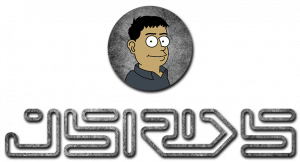
ABOUT JOE
A Computer Scientist with expansive conceptual abilities in Information Security.
Joseph de Saram has significant expertise in the fields of Information Security Architecture, Intelligence Analysis and Digital Forensics. Areas of specialisation include the conceptualisation and design of wide area distributed systems, advanced neural networks, and strong cryptographics. Proven thought leadership, business development and technical mindset have evolved over thirty years.
Proficient, hardworking and focussed, Joseph is able to optimise and greatly enhance existing methodologies by extremely rapid assimilation of new material and modification of structured procedures. He achieves organisational competency through enforcing tough deadlines and rationalisation, and motivating co-workers to optimum efficiency.
Furthermore Joseph’s successful management of clandestine operations from design to delivery in terms of confidentiality, integrity and availability have led to significant improvements in the quality and performance of Intelligence, Surveillance, and Reconnaissance (C4ISR) aspects.
Objective
To provide robust intellect to Aerospace & Defense contracting organisations (including under limited access authorizations) within extremely challenging environments, which demand neoteric solutions. Strong engineering acumen must be a prerequisite, with few limits to remuneration.
JOSEPH DE SARAM CISSP FBCS FCMI FIAP MIEEE MINCOSE MIScT MACS Snr CP
Information Security Architect ● אדריכל אבטחת מידע ● 信息安全建築師 ● Архитектор информационной безопасности ● مهندس أمن المعلومات
Generic address [email protected] • CP500i +807 1742 5273
Transient routing problems may be experienced for the next two weeks or so as configurations are finalised…
Country-Specific sites:
QUOTES








HUMAN RIGHTS
Joseph de Saram has always promoted and campaigned for the Fundamental Human Rights and freedoms that humans are entitled to. A ‘human rights activist’ typically brings out the various human rights violations in the public domain and campaigns to restore these rights, and since the late 1990s Joseph’s focus has been cryptographic projects involving:-

No one shall be subjected to arbitrary interference with his privacy, family, home or correspondence, nor to attacks upon his honour and reputation. Everyone has the right to the protection of the law against such interference or attacks.

Everyone has the right to freedom of opinion and expression; this right includes freedom to hold opinions without interference and to seek, receive and impart information and ideas through any media and regardless of frontiers.
After the Torture and [Political] Psychiatric Fraud of 2015, Joseph truly understood first-hand, the significance of:-

Everyone has the right to life, liberty and security of person.

Everyone has the right to an effective remedy by the competent national tribunals for acts violating the fundamental rights granted him by the constitution or by law.

No one shall be subjected to torture or to cruel, inhuman or degrading treatment or punishment.

No one shall be subjected to arbitrary arrest, detention or exile.
Convention against Torture and Other Cruel, Inhuman or Degrading Treatment or Punishment
The States Parties to this Convention, Considering that, in accordance with the principles proclaimed in the Charter of the United Nations, recognition of the equal and inalienable rights of all members of the human family is the foundation of freedom, justice and peace in the world, Recognizing that those rights derive from the inherent dignity of the human person, Considering the obligation of States under the Charter, in particular Article 55, to promote universal respect for, and observance of, human rights and fundamental freedoms, Having regard to article 5 of the Universal Declaration of Human Rights and article 7 of the International Covenant on Civil and Political Rights, both of which provide that no one shall be subjected to torture or to cruel, inhuman or degrading treatment or punishment, Having regard also to the Declaration on the Protection of All Persons from Being Subjected to Torture and Other Cruel, Inhuman or Degrading Treatment or Punishment, adopted by the General Assembly on 9 December 1975, Desiring to make more effective the struggle against torture and other cruel, inhuman or degrading treatment or punishment throughout the world, Have agreed as follows: limits to remuneration.
Part 1

1. For the purposes of this Convention, the term "torture" means any act by which severe pain or suffering, whether physical or mental, is intentionally inflicted on a person for such purposes as obtaining from him or a third person information or a confession, punishing him for an act he or a third person has committed or is suspected of having committed, or intimidating or coercing him or a third person, or for any reason based on discrimination of any kind, when such pain or suffering is inflicted by or at the instigation of or with the consent or acquiescence of a public official or other person acting in an official capacity. It does not include pain or suffering arising only from, inherent in or incidental to lawful sanctions

1. Each State Party shall ensure that all acts of torture are offences under its criminal law. The same shall apply to an attempt to commit torture and to an act by any person which constitutes complicity or participation in torture.
2. Each State Party shall make these offences punishable by appropriate penalties which take into account their grave nature.
INFORMATION SECURITY

Cryptography
Theory

Banking and Financial Systems

Network Operations
Security

P2P Payment
Authentication

Cryptographically
Secure PRNGs

Key Exchange
Mechanisms

Applied
Cryptography

Secure Distributed
Architectures

Assurance via
Non Repudiation

Multidimensional
Obfuscation

Advanced Neural
Networks

Computational
Infeasibility

Biometric
Authentication

Application
Security

Disaster Recovery
BCP

Financial Network
Security

Law and Forensic
Investigation








CORE INFORMATION SECURITY COMPETENCE
Cryptography
Enforcement
Architectures
Obfuscation
Security
Networks
Infeasibility
INFOSEC OVERVIEW
- Communication & Network Security (1993-2019)
- Security Architecture & Engineering (1993-2019)
- Identity & Access Management (IAM) (1994-2019)
- Security & Risk Management (1995-2019)
- Security Operations (1993-2019)
- Asset Security (1993-2019)
- Security Assessment & Testing (1995-2019)
- Software Development Security (1996-2019)
INFORMATION ARCHITECTURE
- Security Operations Architecture (1993-2019)
- Security Architecture Modeling (1993-2019)
- Identity & Access Management Architecture (1994-2019)
- Architect for Governance, Compliance & Risk (1993-2019)
- Infrastructure Security (1993-2019)
- Architect for Application Security (1996-2019)
PROJECT MANAGEMENT
- Risk Management (1993-2019)
- Contingency Management (1993-2019)
- Leadership & Business Management (1995-2019)
- Threat Intelligence & Incident Management (1993-2019)
- Law, Ethics & Security Compliance (1994-2019)
- Systems Lifecycle Management (1995-2019)
SYSTEMS ENGINEERING PRINCIPLES
- Risk Management (1993-2019)
- Security Planning, Design & Implementation (1993-2019)
- Secure Operations, Maintenance & Disposal (1993-2019)
- Systems Engineering Technical Management (1993-2019)







SFIA 7 INFOTECH EXPERIENCE
SFIA describes skills and competencies required by professionals in roles involved in information and communication technologies, digital transformation and software engineering. SFIA was formally launched in 2000 and its provenance can be traced back to the 1980s and a number of collaborative skills and competency projects. These led to the SFIA Framework and the formation of the SFIA Foundation which has become an international not-for-profit organisation that now brings together the global community to develop and maintain the SFIA Framework for the benefit of all.
SFIA has become the globally accepted common language for the skills and competencies related to information and communication technologies, digital transformation and software engineering.SFIA remains a collaboration – it has been regularly updated through a global open consultation process. People with real practical experience of developing and managing skills/competencies in corporate, public sector and educational environments from all around the world, contribute to ensuring SFIA remains relevant and true. It is built by industry and business for industry and business.
It is these components that set SFIA apart from other frameworks and has resulted in its adoption by governments, corporates and individuals in almost 200 countries. Its unique and ongoing success can also be attributed to:
STRATEGY AND ARCHITECTURE
INFORMATION STRATEGY
GOVN
7
ISCO
7
INAN
7
ITSP
7
SCTY
7
VISL
5
IRMG
7
INAS
7
ICPM
6
ADVICE AND GUIDANCE
CNSL
7
TECH
6
BUSINESS STRATEGY AND PLANNING
DEMM
6
INOV
7
KNOW
6
KNOW
6
ITMG
7
RSCH
6
STPL
7
FMIT
6
BPRE
6
BURM
7
TECHNICAL STRATEGY AND PLANNING
EMRG
6
ARCH
6
COPL
5
DATM
6
NTPL
6
METL
6
CHANGE & TRANSFORMATION
BUSINESS CHANGE IMPLEMENTATION
POMG
7
PROF
6
PGMG
6
PRMG
7
BUSINESS STRATEGY AND PLANNING
BUAN
6
OCDV
7
BPTS
6
BSMO
6
ORDI
7
BENM
6
REQM
6
CIPM
6
DEVELOPMENT AND IMPLEMENTATION
SYSTEMS DEVELOPMENT
DLMG
7
PROG
6
DTAN
5
TEST
6
DESN
6
RESD
6
DBDS
5
SFEN
6
SWDN
6
ADEV
4
NTDS
6
INCA
6
USER EXPERIENCE
URCH
6
USEV
5
UNAN
5
HCEV
6
INSTALLATION AND INTEGRATION
HSIN
5
PORT
6
HWDE
6
DELIVERY AND OPERATION
SERVICE DESIGN
AVMT
6
SLMO
5
SERVICE TRANSITION
SEAC
6
CHMG
6
CFMG
6
RELM
6
ASMG
6
SERVICE OPERATION
SYSP
5
PENT
6
ITOP
4
NTAS
5
CPMG
6
RFEN
6
DBAD
5
PBMG
5
SCAD
6
ADEV
5
STMG
6
USUP
5
SKILLS AND QUALITY
SKILL MANAGEMENT
ETMG
7
ETDL
5
LEDA
6
TEAC
5
TMCR
5
PEOPLE MANAGEMENT
PEMT
6
RESC
5
PDSV
6
QUALITY AND CONFORMANCE
QUMG
7
CORE
6
CFMG
6
SFAS
6
ASMG
6
DGFS
6
RELATIONSHIPS AND ENGAGEMENT
STAKEHOLDER MANAGEMENT
SORC
6
RLMT
7
SUPP
6
CSMG
5
ITCM
6
SALES AND MARKETING
MKTG
6
PROD
6
SALE
6
SSUP
5







OTHER INFOTECH EXPERIENCE
DESKTOP OS EXPERIENCE
27yrs 04mths (328mths)
05yrs 03mths (63mths)
15yrs 04mths (184mths)
09yrs 10mths (118mths)
21yrs 04mths (256mths)
05yrs 03mths (63mths)
11yrs 04mths (136mths)
09yrs 10mths (118mths)
PROGRAMMING LANGUAGE EXPERIENCE
17yrs 04mths (208mths)
08yrs 10mths (106mths)
03yrs 10mths (46mths)
8yrs 10mths (106mths)
23yrs 10mths (286mths)
08yrs 10mths (106mths)
Used by US Dept of Defense (1982-1985)
11yrs 04mths (136mths)
MOBILE OS EXPERIENCE
10yrs 04mths (124mths)
08yrs 10mths (106mths)
09yrs 09mths (117mths)
DATABASE EXPERIENCE
14yrs 04mths (172mths)
19yrs 00mths (228mths)
13yrs 00mths (168mths)
ENTERPRISE RESOURCE PLANNING
Release 3.0F-4.6C / 4.70 (1997-2010)
CRM 3.0 / 3.1 / 4.0 (2002-2005)
BW 2.0B / 2.1 / 3.0A / 3.0B (2000-2005)
SEM-BW / SEM-BCS 3.1B-3.50 (2002-2005)







PR & MEDIA SITES
PR & MEDIA SITES
SFIA describes skills and competencies required by professionals in roles involved in information and communication technologies, digital transformation and software engineering. SFIA was formally launched in 2000 and its provenance can be traced back to the 1980s and a number of collaborative skills and competency projects. These led to the SFIA Framework and the formation of the SFIA Foundation which has become an international not-for-profit organisation that now brings together the global community to develop and maintain the SFIA Framework for the benefit of all. SFIA has become the globally accepted common language for the skills and competencies related to information and communication technologies, digital transformation and software engineering.

www.pimediaonline.co.uk

www.independent.co.uk

www.rhodium.com

www.derbyshiretimes.co.uk

www2.deloitte.com/uk/en.html

www.emc-dnl.co.uk

www.joseph-de-saram-rhodium...

www.bmmagazine.co.uk

www.insidermedia.com/publicatio...

www.thetimes.co.uk

www.telegraph.co.uk

www.thestar.co.uk

www.theasianbusinessawards.co.uk

www.standard.co.uk

www.thenation.org.uk

www.dailymail.co.uk

www.thecourier.co.uk/tag/scottish...

www.metro.co.uk

www.newslanka.net

www.derbyshiretimes.co.uk

www.mailonsunday.co.uk/mailons...

www.island.lk

www.ft.lk

www.thesundayleader.lk

www.scs.org.sg/index.php
CONTACT









